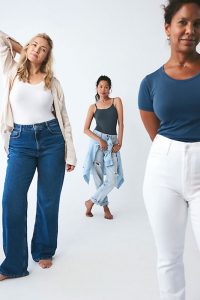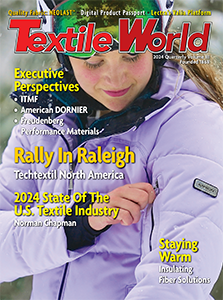MAS Holdings’ Pilar Diaz and Thanuja Jayawardene discuss the company’s femtech innovations.
TW Special Report
Sri Lanka-based MAS Holdings began as a lingerie manufacturer in 1987. The company was started by three brothers —Mahesh, Ajay and Sharad Amalen — and today comprises a portfolio of businesses focused on manufacturing intimate apparel, shapewear, swimwear, activewear — training & performance — leisurewear and athleisurewear, wearable technology, health tech, adaptive apparel, and impact protection gear.
The company’s portfolio includes MAS Acme, established in 2017 following the acquisition of ACME-McCrary Corp., a hosiery manufacturer founded in 1909 in Asheboro, N.C. MAS also operates a sketch-to-scale technology company that creates next-to-skin apparel solutions in consumer technology, consumer health and connected clothing. Additionally, MAS owns industrial parks and provides partnered logistic services to customers.
MAS Holdings currently operates 52 facilities located in 15 different countries. The company employs more than 115,000 people, and more than 70 percent of its workforce is female. MAS is proud of its global reputation for an ethical and sustainable working environment. Part of its unique mission includes a commitment to women and an emphasis on women’s empowerment.
MAS began its foray into the feminine hygiene technology (femtech) space in 2014, as it researched urinary incontinence underwear products. MAS also made an investment in its customer, Thinx — a New York City-based brand that produces absorbent menstruation underwear. MAS reports it assisted the brand — one that was focused on using its products and marketing to break the taboo surrounding periods — to scale from a start-up to a market leader over the past eight years.
MAS has continued to develop products for the femtech market and now also offers cooling and temperature regulating clothing as a solution for menopause challenges under its own brand Become, as well as reusable nursing pads for new mothers, among other products.
With International Women’s Day in the spotlight, Textile World had the opportunity to speak with MAS Holdings’ Global Head of Femtech Pilar Diaz and General Manager of Women’s Empowerment Thanuja Jayawardene about the company’s innovation in the femtech sector. The company is on a mission to devise solutions to ease the physical symptoms and challenges faced by women at various stages of their lives, and has a vision for a new generation of fabrics that help empower women around the world.
TW: What originally led MAS to identify urinary incontinence products as a potential market for the company? Were there synergies with existing MAS product lines?

Pilar Diaz: MAS started work in the urinary incontinence (UI) space in 2014. Our research at the time showed us that one in four women over the age of 18 experience episodes of urinary leakage. We also learned that UI is the fifth-largest health-related problem that has the greatest negative impact on the quality of life for women. Understanding the challenges and discomfort caused by UI, we wanted to help women live a normal life without having to wear a disposable pad every single day. Disposable pads are not only an expensive and unsustainable solution to UI, but are often a harsh reminder to women of their condition.
At MAS, we took it upon ourselves to apply our expertise in apparel, specifically within the intimates space, to innovate a more impactful solution than those disposable products. We created a product that looked and felt like regular underwear with absorbent function embedded in it.
TW: What other femtech products does MAS produce? Are there other femtech innovations in the works?
Diaz: MAS develops a number of solutions that improve women’s health and well-being as they go through the different life-stages, from the first menstruation to the last, and everything in between. Our range of solutions include products designed for period care, urinary incontinence, pregnancy, postpartum and menopause.
Today, our products have revolutionized the reusable absorbent underwear space. We have also been first in the market to launch a menopause specific clothing line, addressing the number one symptom of menopause — hot flashes.
Currently, we are researching new areas within the femtech space and are working towards developing innovative products that can bring normalcy to women’s lives. We are determined to find superior solutions for women’s health and well-being, including ones that have not been explored yet.
TW: Has MAS utilized any new textile innovations to elevate femtech performance?
Diaz: Apart from regular body fabric, lace and other fashion trims, MAS has invested in developing reusable, functional materials with a range of performance attributes such as quick-drying, high-absorbency, moisture-wicking and temperature-regulating technologies that truly elevate the effectiveness of our femtech products. These technologies are applied to address the multiple pain points of the female reproductive cycle.
To ease menopausal symptoms for example, our patented Anti Flush Technology for hot flashes keeps the wearer cool and comfortable by transferring heat, wicking moisture and reducing odor. Combining HydraDerma and Anti Flush technology reduces the loss of moisture while offering relief from itching and is meant to soothe irritated skin. Similarly, we apply these innovative technologies or combinations of them to bring the best benefit to women, at multiple stages of their life.

TW: What environmental benefits do the period underwear and incontinence products offer?
Diaz: On average, a woman will have around 450 periods in her lifetime, which equates to nearly 10 years of our lives bleeding! Naturally, the usage of menstrual products is high. What we don’t realize are the startling amount of waste created by conventional menstrual and urinary incontinence products and their impact on the environment. Tampons and pads — which include wrappers and applicators — constitute 7 percent of the world’s landfill. According to a 2015 research, half of women in the United Kingdom flush up to 2 billion sanitary items each year.
The washable and reusable period and UI underwear we make help to reduce the impact of menstrual and urinary incontinence products on landfills. Not only are these products sustainable alternatives that are better for the planet, but they also ease the economic burden resulting from the cost of purchasing disposables and help improve women’s well-being.
TW: How large are the product lines, and where are the products sold?
Diaz: Some of the femtech products in our current range include washable absorbent underwear for periods and UI; period pain solutions; reusable, absorbent nursing pads and bras; and diverse clothing products such as daywear, nightwear, shapewear and activewear for menopause.
We work with major brands both in the fashion industry as well as in the hygiene and health industry. Products made by MAS are sold around the world in both e-commerce and retail stores.
TW: Women comprise the majority of the company’s workforce. How do you support your female employees, and what opportunities and initiatives are available to women at the company?

Jayawardene: Being an organization relying so heavily on the work and progress of women, we are in the best position to understand the need for gender parity and why female empowerment is essential for thriving and sustainable businesses, stronger economies and better nations.
Since we started, our work has been about enriching the lives of these women who make up the most significant part of our organization. But in 2003, our commitment to empowering women and breaking existing biases was translated into a strategic and result oriented program known as Women Go Beyond. Through this, we seek to improve and enrich the lives of our female associates as well as their families and communities.
In 2021 alone, MAS conducted 1,624 initiatives helping create 328,218 opportunities for people within the organization and in their communities, with 248,221 of these opportunities benefitting women across the group. While some areas covered by these projects were related to employment and financial empowerment such as skill development, career advancement and entrepreneurship, others went beyond these opportunities towards addressing gaps at the grass root level, creating awareness about women’s health and preventing gender-based violence. These are critical areas to address in the communities we operate.
The company has also set itself a goal to increase female representation in management and has launched multiple active interventions including family friendly policies, infrastructure support, unconscious bias reduction workshops, mentorship and sponsorship for women, strategies for recruitment and retention of women, flexible work arrangements and childcare support, and more.
It is encouraging to note that female representation on MAS Holding’s company boards also saw an increase from 13 percent in 2020 to 20 percent in 2021. Other indicators including rising female representation in senior management, the share of women recruited for roles above executive level and reduced turnover among female associates are a testament to the tangible results of MAS’ commitment to empowering women.
March/April 2022




